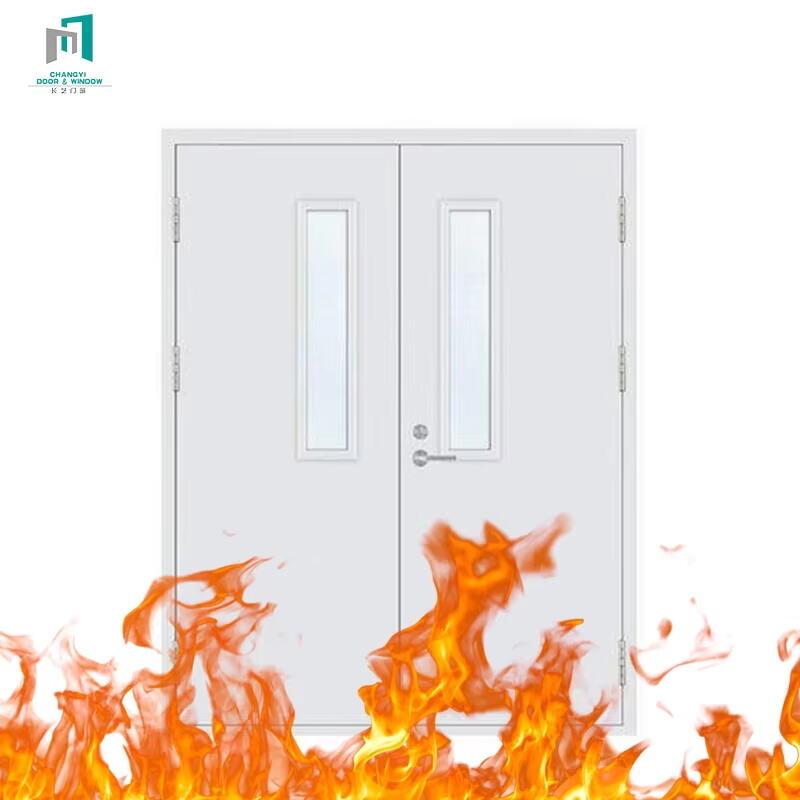소개: 건물 안전에서 방화문의 중요한 역할
방화문은 오늘날 건물 설계에서 매우 중요한 역할을 하며, 기본적으로 화재로 인한 피해로부터 보호 역할을 수행합니다. 건물에 이러한 문이 올바르게 설치되면 화재 확산 속도를 늦추어 위험한 상황이 되기 전에 건물 내부에 있는 사람들이 대피할 수 있는 시간을 더 확보할 수 있습니다. 연구에 따르면 방화문이 제대로 설치된 장소에서는 화재 발생 시 생존 가능성이 더 높은 것으로 나타났는데, 이는 이러한 문들이 건물 내부로 화염과 연기의 확산을 막아주기 때문입니다. 대부분의 방화문은 엄격한 안전 규정에 따라 설계되어 있어 위기 상황에서 단순한 물리적 장벽 역할뿐만 아니라 실제로 생명을 구하는 역할도 수행합니다. 이는 모두가 적절한 안전 규정을 준수하면서 위급한 순간에도 건물 이용객의 안전을 보장할 수 있도록 해줍니다.
현대 건축에서 방화문이 중요한 이유
방화문은 오늘날 건물 설계에서 매우 중요한 역할을 합니다. 특수하게 제작된 이 문들은 화재가 건물 전체로 확산되는 것을 막아주어, 내부에 있는 모든 사람에게 보다 안전한 환경을 제공합니다. 다양한 연구에 따르면 적절히 설치된 방화문이 있는 건물에서는 화재 상황에서도 생존할 가능성이 훨씬 높아집니다. 이러한 문들은 대피에 필요한 소중한 시간을 확보할 뿐만 아니라, 화재가 대형 참사로 번지기 전에 진압할 수 있는 귀중한 시간을 소방관들에게 제공합니다. 방화문 대부분의 건축 규정에서는 방화문 설치를 요구하고 있으며, 이는 비상 상황에서 이 문들이 수행하는 기능을 고려할 때 합리적인 조치입니다. 강화된 소재와 특수한 밀폐 구조를 갖춘 방화문은 거주자의 안전이 가장 중요한 모든 신축 건물에 반드시 포함되어야 합니다.
화재의 높은 위험 문 vs 일반 문 선택
방화문과 일반 문 중 어떤 것을 설치할지를 결정하는 일은 대부분의 사람들이 생각하는 것보다 훨씬 더 중요합니다. 사무실 건물이나 학교처럼 사람들이 자주 드나드는 장소의 경우, 이 선택은 화재 시 literally 생명을 구할 수 있습니다. 일반 문은 열과 화염에 견디도록 설계되지 않았기 때문에 이러한 상황에 적합하지 않으며, 방화 규정 검사를 통과하지 못합니다. 이는 법적으로도 큰 문제를 일으킬 수 있습니다. 건축가, 시공팀, 그리고 건물 관리자들은 이러한 차이를 정확히 이해하고 있어야 합니다. 방화문은 단지 소방서 규정을 따르기 위한 것이 아닙니다. 실제로 화재가 확산되는 속도를 늦추어 건물 내부 인원이 보다 안전하게 대피할 수 있는 시간을 확보해 주는 역할을 합니다. 이러한 현명한 결정은 법적 기준을 충족하는 것은 물론, 매일 그 공간을 사용하는 모든 이들의 안전을 실질적으로 보장하는 환경을 만드는 데 기여합니다.
화재 문이란? 생명을 구하는 목적 정의
화재 문 정의: 단순한 장벽 이상
방화문은 화재 발생 시 건물을 안전하게 유지하는 데 중요한 역할을 하는 특수하게 제작된 장벽입니다. 이러한 문은 화염과 연기가 건물 전체로 퍼지는 것을 막아주며, 비상 상황 시 사람들에게 필수적인 보호를 제공합니다. 화재가 발생하면 방화문은 건물 내부를 구획하여 대피 경로를 맑고 안전하게 유지함으로써 사람들이 연기나 불에 가로막히지 않고 밖으로 빠져나올 수 있도록 도와줍니다. 설치 전에 방화문은 열과 화염을 얼마나 오래 견딜 수 있는지 엄격한 테스트를 거치는데, 이는 적절한 화재 안전 시스템에서 매우 중요한 요소입니다. 일반 건물 곳곳에 있는 일반 문과 달리 방화문은 더 강하고 두꺼운 재질로 만들어져 일정한 시간 동안 실제로 화재에 견뎌낼 수 있습니다. 이는 대피 중 건물 내 머무는 사람들에게 소중한 추가적인 대피 시간을 확보해 줍니다.
핵심 구성 요소: 강철, 팽창형 실링, 자동 닫힘 장치
방화문이 제대로 작동하도록 구성된 요소들을 이해하는 것은 그 기능을 올바르게 수행하는 데 매우 중요합니다. 대부분의 방화문은 강철로 만들어지는데, 이는 높은 열에도 견디며 다른 소재보다 오래 사용할 수 있기 때문입니다. 하지만 강철만으로는 설명이 다 되지 않습니다. 방화문에는 열을 받으면 팽창하면서 연기를 막아주는 특수한 밀폐장치인 인터메선트 실(seal)이라는 것이 붙어 있습니다. 이는 상당히 현명한 설계라고 할 수 있죠. 또 다른 중요한 구성 요소는 자동 닫힘 장치입니다. 누군가 문을 열면 이 장치가 작동하여 문이 스스로 다시 닫히게 합니다. 이를 통해 불이 난 공간에서 복도나 아직 불이 붙지 않은 방으로 화재가 확산되는 것을 막을 수 있습니다. 이처럼 다양한 부품들이 함께 작동함으로써 단순해 보이는 문이 실제로는 훨씬 진보된 보호 기능을 갖춘 장치가 되는 것이며, 예기치 못하게 불이 시작될 수 있는 공간에서 실질적인 안전을 제공하는 것입니다.
화재 문과 일반 문의 주요 차이점
소재 및 구조: 강철 대 미처리 목재
대부분의 방화문은 표준 목재 문과 달리 화염에 견디는 강철 또는 다른 소재로 제작되며, 열 저항성을 향상시키기 위한 처리를 거치지 않습니다. 이러한 문의 제작 방식은 실제 화재 상황에서 큰 차이를 보여줍니다. 강철은 방화문에 추가적인 견고함을 부여하며 극심한 열에도 버틸 수 있게 해주므로 건축 규정에서 요구하는 엄격한 안전 테스트를 통과할 수 있습니다. 단순히 더 튼튼한 것을 넘어, 이러한 제작 방식 덕분에 일반 문이 금방 무너질 때 방화문은 실제로 화재 확산을 늦출 수 있습니다. 이것이 바로 건축가와 시공사가 상업용 건물 및 주거용 단지 전반에 적절한 등급의 방화문 설치를 고집하는 이유입니다.
화재 저항 등급: 30/60/90분 클래스 이해
방화문은 화염과 강한 열기를 얼마나 오래 막아낼 수 있는지에 따라 분류되며, 일반적으로 30분, 60분, 또는 90분 등급으로 구분됩니다. 건축가와 건물 안전 전문가들은 화재 시 인명을 보호해야 하는 구조물을 설계할 때 이러한 등급을 매우 중요하게 활용합니다. 일반 문은 이러한 방화 등급이 없기 때문에, 비상 상황에서 인명 안전을 보장할 수 없습니다. 이러한 다양한 분류는 전문가들이 실제 안전 상황에서 문의 성능을 명확하게 평가할 수 있는 기준이 되므로, 방화문은 철저한 화재 예방 계획에서 필수적인 요소로 자리매김하고 있습니다.
기능성: 구획화 대 기본 구분
방화문은 건물 내부를 별도의 구획으로 나누어 화재가 빠르게 확산되는 것을 방지하고 비상 상황 시 대피 경로를 확보하는 역할을 합니다. 이러한 특수한 문들은 사람들이 도움이 올 때까지 대피소로 사용할 수 있는 안전한 공간을 구조물 전반에 걸쳐 유지합니다. 일반 가정용 문은 공간만 분리할 뿐 오랜 시간 동안 화염을 막아내지는 못합니다. 이들은 열이나 연기로부터의 보호 기능이 거의 없는 방 간의 벽 역할만 할 뿐입니다. 시설 관리자들이 방화문이 위험 요소를 줄이는 데 실제로 어떤 기능을 하는지 이해하게 되면 신축이나 리모델링 시 설치 위치 선정에 있어 더 현명한 결정을 내리게 됩니다. 똑똑한 건축 방식은 이러한 필수적인 안전 요소들을 나중에 추가하는 방식이 아닌, 설계 초기 단계부터 고려하는 데 있습니다.
안전 기능: 연기 차단 장치 대 일반 문 틈새
연기 밀폐장치는 제대로 된 방화문에 포함된 가장 중요한 안전 요소 중 하나입니다. 이러한 밀폐장치는 연기가 새어 나갈 수 있는 틈을 막아 건물 내부로 연기가 퍼지는 것을 방지합니다. 일반 문은 이런 필수적인 부품을 내장하고 있지 않습니다. 화재가 발생했을 때 연기 밀폐장치는 연기를 마시게 되면 치명적인 위험을 피해야 하는 사람들에게 실제로 큰 차이를 만듭니다. 건물 전체의 화재 안전을 고려한다면 고품질의 연기 밀폐 기능이 우수한 방화문에 투자하는 것은 단순히 현명한 선택이 아니라 생명과 재산을 보호하기 위해 필수적입니다.
화재 문의 이점: 기본 준수를 넘어서
안전한 대피를 위한 생명 구조 시간 확보
화재 시 화재문은 경보가 울릴 때 추가적인 귀중한 몇 분을 확보해 모든 사람이 보다 안전하게 대피할 수 있도록 해줍니다. 연구에 따르면 이러한 짧은 시간이 생명을 구하거나 잃는 결정적인 요인이 되는 경우가 많습니다. 화재는 결코 가볍게 여길 수 없는 심각한 문제이기 때문에 적절한 화재문에 투자하는 일은 사람들의 생명과 안전에 대한 진정한 관심을 보여주는 것입니다. 불이 더 느리게 번지고 연기가 방 안을 빠르게 가득 채우지 못하게 되면, 대피자들은 위험한 상황이 되기 전에 출구를 찾아 탈출할 시간을 가질 수 있습니다. 이것이 비상 상황 시 고품질의 화재문이 매우 중요한 이유입니다. 이는 생명을 구하는 귀중한 몇 초를 확보해 줄 수 있으며, 그렇지 않으면 모든 것을 잃을 수도 있습니다.
방화로 인한 재산 보호
방화문은 인명을 구하는 것뿐만 아니라 화재가 발생했을 때 건물이 심각한 손해를 입는 것을 막는 역할도 합니다. 이러한 문들은 구조물 내부로 화염이 퍼지는 것을 막아 비상 상황 시 전체적인 피해를 줄여줍니다. 예를 들어, 어느 한 방에서 화재가 시작된다면 고품질의 방화문은 불이 번지는 것을 막아 전체 건물이 불타는 것을 방지할 수 있습니다. 많은 건물 소유자들이 방화문의 중요성을 재난이 닥치기 전까지 간과하곤 하지만, 적절한 방화문 설치에 투자한 사람들은 장기적으로 상당한 비용을 절약할 수 있습니다. 사람과 자산을 보호하기를 원하는 모든 이들에게 방화문을 전체 안전 계획에 포함시키는 것은 매우 합리적인 선택입니다. 결국 누구나 예방할 수 있는 사고 이후 소중한 재산을 잃거나 막대한 수리비를 부담하고 싶어 하지는 않을 테니까요.
보험 혜택과 법적 준수
방화문을 설치하면 보험 비용 측면에서도 실질적인 이점을 얻을 수 있습니다. 이러한 문들은 화재 위험을 줄이는 데 도움을 주기 때문에 설치 후 보험료가 인하되는 경우가 많습니다. 대부분의 보험사는 건물에 적절한 화재 예방 장치가 전반적으로 설치되어 있을 경우 더 유리한 보험 요율을 제공합니다. 하지만 단순히 비용 절감 측면을 넘어서서 또 다른 중요한 측면도 존재합니다. 건축 규정에서는 특정 화재 안전 기준을 요구하고 있으며, 이러한 규정을 따르지 않는 경우 향후 심각한 벌금이 부과될 수 있습니다. 실제로 방화문 설치가 의무임에도 불구하고 이를 따르지 않은 채로 임대를 진행한 건물주들이 수천만 원에 달하는 벌금을 부과받은 사례도 있었습니다. 따라서 안전이 최우선 과제임은 분명하지만, 방화문은 거주자의 안전뿐만 아니라 향후 발생할 수 있는 법적 문제까지 방지하는 일석이조의 효과를 갖는 셈입니다.
결론: 화재 안전에서 화재 문의 중요성을 다시 한번 요약합니다.
방화문은 화재 시 건물을 안전하게 유지하는 데 있어 매우 중요하며, 불길을 차단하고 사람과 재산을 보호하는 역할을 합니다. 일반 문은 단순히 공간을 구분하고 미관상의 역할만 하는 반면, 방화문은 화재, 연기 및 위험한 가스의 확산을 막기 위해 특별히 설계되었습니다. 이러한 특수 문은 열에 견디는 소재로 만들어졌으며, 자동 닫힘 장치 같은 기능을 갖추고 있어서 아무도 문을 닫지 않더라도 스스로 닫혀 효과를 발휘합니다. 이처럼 몇 분의 시간을 벌어주는 방화문은 대피하는 사람들이나 소방대원들이 화재와 싸우는 데 있어 생사의 차이를 만들 수 있습니다. 설치 전에 모든 방화문은 극한의 조건에서도 제대로 작동하는지를 확인받기 위해 엄격한 테스트를 거치게 되며, 그래서 건축 규정에서 많은 구역에 방화문 설치를 요구하고 있습니다. 올바르게 설치되고 유지관리된 방화문은 단순히 규정을 따르는 것을 넘어 매일 생명을 구하고 있으며, 이 점은 건물 소유자나 관리자들이 간과해서는 안 될 사항입니다.
자주 묻는 질문 섹션
화재 문의 주요 목적은 무엇입니까?
화재 문의 주요 목적은 화재 발생 시 건물 내부를 구획하여 불과 연기의 확산을 방지하고, 이로써 안전한 대피를 가능하게 하며 거주자의 잠재적 피해를 줄이는 것이다.
화재 문의 핵심 구성 요소는 무엇인가요?
화재 문은 일반적으로 내구성을 위해 스틸 구조, 연기를 차단하기 위한 팽창형 밀봉재 및 자동으로 문이 닫히도록 설계된 자기 폐쇄 메커니즘을 포함한다.
화재 문은 일반 문과 어떻게 다릅니까?
화재 문은 특정 시간 동안 화재에 견딜 수 있도록 설계된 스틸과 같은 내화 재질로 만들어진 반면, 일반 문은 이러한 내화 특성이 부족하여 화재 시 효과적인 보호를 제공하지 못한다.
왜 고위험 지역에서 화재 문이 중요한가요?
화재 문은 주방과 전기실과 같은 고위험 지역에서 화재의 확산을 방지하고 이러한 구역이 보호되며 최고의 안전 관행을 준수하도록 하는 데 중요하다.
화재 문을 설치하는 데 어떤 이점이 있습니까?
화재 문을 설치하면 대피 시 향상된 생명 안전, 재산 보호를 위한 화재 확산 방지, 낮아진 보험료를 통한 보험 혜택, 법적 안전 표준 준수 등의 이점이 있습니다.

